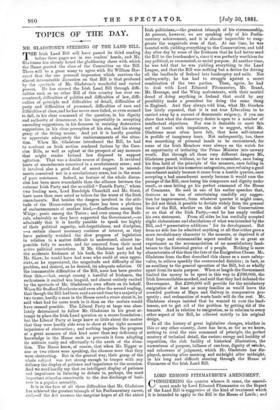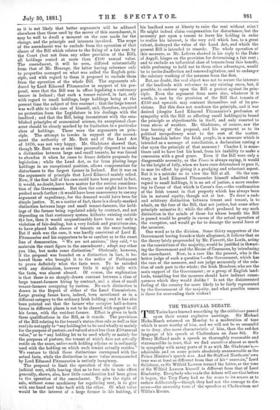LORD EDMOND FITZMAURICE'S AMENDMENT.
flONSIDERING the quarter whence it came, the amend- ment made by Lord Edmond Fitzmaurice on the Report of the Land Bill is suggestive of the kind of treatment which it is intended to apply to the Bill in the House of Lords ; and elsewhere than those used by the mover of this amendment, it may be well to dwell a moment on the case made for the change, and the principle and interests involved. The scope of the amendment was to exclude from the operation of that clause of the Bill which relates to the fixing of a fair rent by the Court (but not from any other provision of the Bill), all holdings rented at more than £100 annual value. The amendment, it will be seen, differed substantially from that of Mr. Heneage, the latter having reference only to properties managed on what was called the English prin- ciple, and with regard to them it proposed to exclude them from the operation of the whole Bill. The arguments ad- duced by 'Lord Edmond Fitzmaurice in support of his pro- posal, were that the Bill was in effect legalising a customary tenure in Ireland ; that such a tenure existed, in fact, only with regard to small holdings, large holdings being at the present time the subject of free contract ; that the large tenant was well able to take care of himself, and, therefore, required no protection from the Legislature in his dealings with the landlord ; and that the Bill, being inconsistent with the esta- blished principles of economical science, its exceptional char- acter should be clearly marked by its limitation to a particular
class of holdings. These were the arguments on prin- ciple. The attempt to invoke in support of the amend- ment the authority of Mr. Butt and of the Land Act of 1870, was not very happy. Mr. Gladstone showed that, though Mr. Butt was at one time personally disposed to make a distinction between large and small tenants, he was forced to abandon it when he came to frame definite proposals for legislation ; while the Land Act, so far from placing large holdings in an exceptional position, allows compensation for disturbance to the largest farmer in Ireland. But it was on the arguments of principle that Lord Edmond mainly relied. Now, if the first half of his case could have been proved in fact, it would, no doubt, have been matter for the serious considera- tion of the Government. But then the case might have been pushed much farther ; it would have been unnecessary to use any argument of expediency, for the demand would have been for simple justice. If, as a matter of fact, there is a clearly-marked distinction between large and small tenant-farmers, the hold- ings of the former being regulated solely by contract, and not depending on that customary system hitherto existing outside the law, then it would unquestionably have been not only a violation of fair-dealing, but a very foolish and gratuitous one, to have placed both classes of tenants on the same footing. But if such was the case, it was hardly consistent of Lord E. Fitzmauriee and his supporters to be so careless as to the exact line of demarcation. "We are not anxious," they said, "to maintain the exact figure in the amendment ; adopt any other you like, but make some distinction." Obviously, however, if the proposal was founded on a distinction in fact, it be- hoved those who brought it to the notice of Parliament to prove definitely what the facts were. To be satisfied with any distinction, however little it might tally with the facts, was almost absurd. Of course, the explanation is that there is no sharply-drawn contrast between a class of large tenant-farmers hiring by contract, and a class of small tenant-farmers occupying by custom. No such distinction is drawn in the Report of either of the Land Commissions. Large grazing farms have, indeed, been mentioned as in a different category to the ordinary Irish holding ; and it has also been pointed out that the farmer who occupies half-a-dozen farms in different places is not to be classed, with regard to all his farms, with the resident farmer. Effect is given to both these qualifications in the Bill, as it stands. The provisions of the Bill relating to the tenant's status (free sale as well as fair rent) do not apply to "any holding let to be used wholly or mainly for the purpose of pasture, and valued at not less than £50 annual value," or to "any holding let to be used wholly or mainly for
the purposes of pasture, the tenant of which does not actually reside on the same, unless such holding adjoins or is ordinarily used with the holding on which such tenant actually resides." We venture to think these distinctions correspond with the actual facts, while the distinction in mere value recommended by Lord Edmond Fitzmaurice is entirely imaginary.
The proposal to limit the operation of the clause as to judicial rent, while leaving that as to free sale to take effect generally, shows, also, how little consideration had been given to the operation of the amendment. To give the right of sale, without some machinery for regulating rent, is to give with one hand and take back with the other. Of what value 'would be the interest of a large farmer in his holding, if He might indeed claim compensation for disturbance, but the necessity put upon a tenant to leave his holding in order to realise his interest, is the very evil which has, to a great extent, destroyed the value of the Land Act, and which the present Bill is intended to remedy. The whole operation of this measure, as Mr. Leferre showed in his reply to the Duke of Argyll, hinges on the provision for determining a fair rent ; and to exclude an influential class of tenants from this benefit, while professing to hold out to them other advantages, would be to invite disaffection and renewed agitation, and to endanger the salutary working of the measure from the first.
But, no doubt, the real object was not to secure the interests of the landlords with reference to any existing cases, but, if possible, to endorse upon the Bill a protest against its prin- ciple. Even the argument from mere size, whatever it is worth, is met by the provision of the Bill that tenants of £150 and upwards may contract themselves out of its pro- visions. But this does not condemn the principle, and it was desired (despite Lord Edmond Fitzmaurice's profession of sympathy with the Bill as affecting small holdings) to brand the principle as objectionable in itself, and only resorted to from stress of weather. Mr. Gladstone, of course, saw the true bearing of the proposal, and his argument as to its political inexpediency went to the root of the matter. Why brandish before the Irish people, in a measure which is intended as a message of conciliation, a declaration casting a slur upon the principle of that measure ? Charles I. is some- times said to have lost his head, from his inability to make a concession with a good grace. Even if the Bill were only a disagreeable necessity, as the Times is always saying, it would be the height of folly, when we have once determined to pass it, to mar its effect by giving it a grudging and reluctant aspect. But it is a mistake so to view the Bill at all. On the con- trary, as Lord Edmond Fitzmaurice himself admitted with regard to small holdings, it is an act of justice, a mere render- ing to Cassar of that which is Ctesar's due,—the confirmation of the Irish tenant in that property which has always been his in natural equity, though not at law. To draw a rude. and arbitrary distinction between tenant and tenant, is to admit, on the face of the Bill, that not justice, but some other principle animates it ; while the effect produced by any such distinction in the minds of those for whose benefit the Bill is passed would be greatly in excess of the actual operation of the exception, and would go far to damage the moral force of the measure.
One word as to the division. Some thirty supporters of the Government having forsaken their allegiance, it follows that on the theory lately propounded by Mr. Fawcett, the Lords, acting on the convictions of the majority, would be justified in thwart- ing the Government and the House of Commons, by introducing the amendment. Now, in a case like the present, who is the better judge of such a question 1—the Government, which has the care of the measure, and can judge accurately of the rela- tion of each part to the whole; the Irish Members, who are the main support of the Government ; or a group of English land- lords, trembling lest the measure should have indirect conse- quences which they would dislike ? Is not the disinterested feeling of the country far more likely to be fairly represented by the Government of the majoiity, and what possible reason is there for over-ruling their wishes?



































 Previous page
Previous page